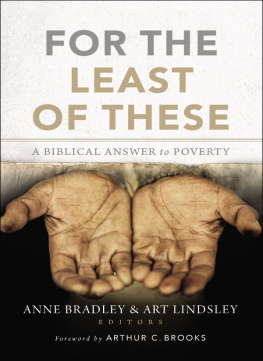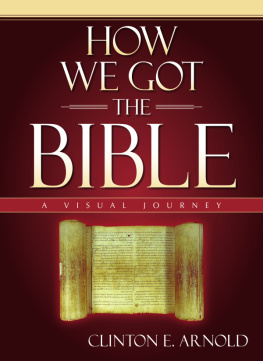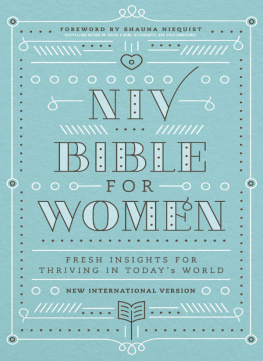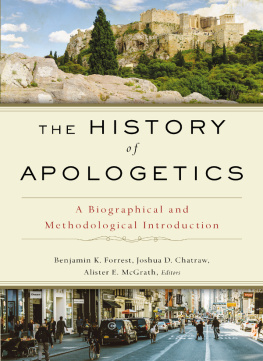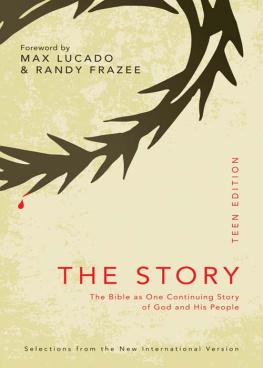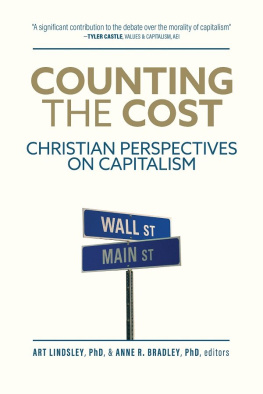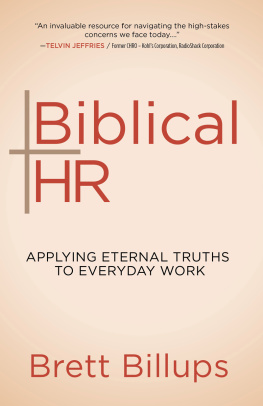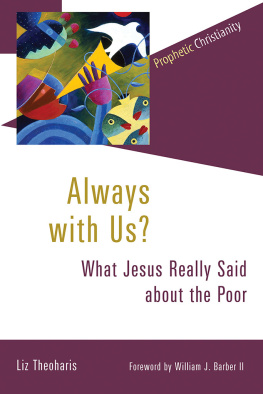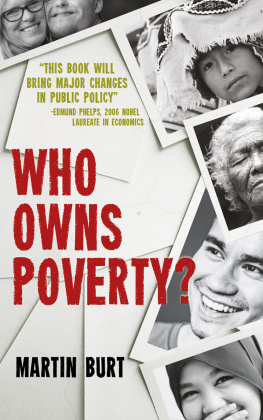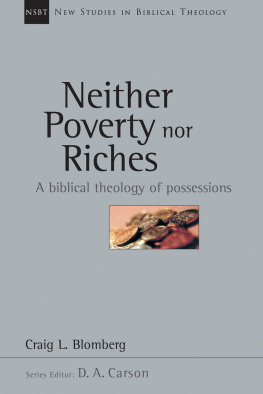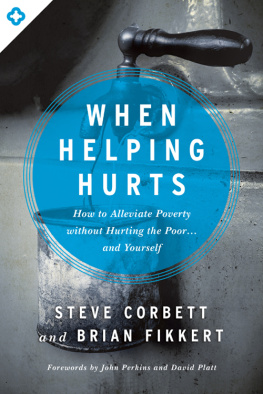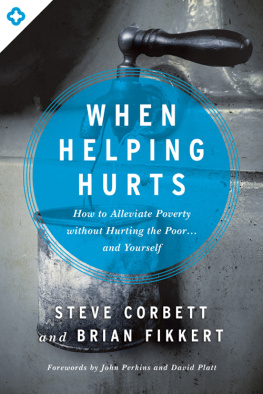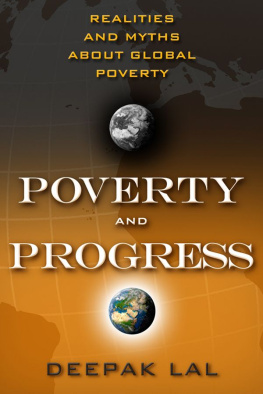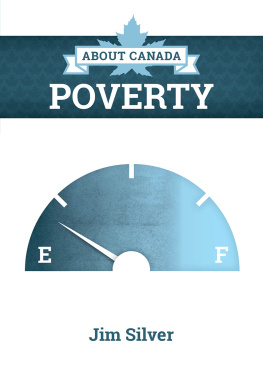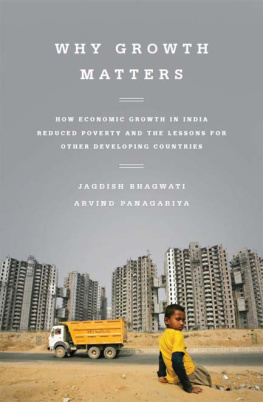
This valuable volume provides solutions to poverty that really work, in contrast to many well-intentioned but harmful solutions that are popular in much of society today. It contains a wide range of practical and biblical insights from the accumulated wisdom of experts who have spent a large portion of their lives developing expertise in how economies actually function in the real world, as well as many useful theological insights on the problem of poverty.
Wayne Grudem, PhD, Research Professor of Theology and Biblical Studies at Phoenix Seminary
This book engagingly addresses poverty from a biblical point of view, convincingly demonstrating the case for free enterprise as the best means for the transformational development of the poor.
Luis Bush, PhD, International Facilitator of Transform World Connections
This book soundly tackles the most important social task of Christians over the next twenty years: the urgent need to break the chains of poverty for the worlds billion-plus poor. For the Least of These: A Biblical Answer to Poverty critically balances the discussion between the poor in biblical times and who they are today, as well as examining the economic principles behind poverty and prosperity. The books empirical analysis reveals that great progress has been madeand sound methods discoveredfor breaking the chains of poverty. The editors are to be praised for their unique concentration on both biblical principles and sound empirical research to determine what works and what doesnt to free the poor from poverty.
Michael Novak, Author of The Spirit of Democratic Capitalism
The Institute for Faith, Work & Economics has done an excellent job of recruiting a number of outstanding theologians and scholars to put together this primer on how Christians should address the issue of poverty. The writers have even-handedly dealt with the biblical mandate to show compassion for the poor in an effective and moral way. The various essays are sound both theologically and economically. Any Christian interested in his duty to the poor will gain significant insights by reading this book.
Paul A. Cleveland, PhD, Professor of Finance and Economics at Birmingham-Southern College
Youre probably familiar with the following justification for redistribution: we in the west are rich because we stole our wealth from everyone else, the rest of the world remains poor because we wont share, and it is the churchs responsibility to alleviate these historic injustices through income redistribution. The chapters in For the Least of These suggest that this emotionally appealing story is wrong. In this volume, you will find a combination of careful biblical exegesis and economic analysis that will cause you to rethink some of your assumptions about the sources of poverty and prosperity.
Art Carden, PhD, Assistant Professor of Economics at Samford University
As Christians, we must reimagine our call to Good Samaritanism to include a right view of economics if we are to fully love our neighbors with our hearts and our minds. This book is a robust tool to help you in your journey toward a fuller theology of Good Samaritanism, one that takes into account the driving forces fueling human flourishing across the world.
Chris Horst, Director of Development at HOPE International and author of Mission Drift
I typically turn and run from books with entries by a dozen authors. But not this one: the chapters of For the Least of These are tied together by a rich, shared commitment to Holy Scripture and a heart for genuinely helping the poor in ways that affirm, rather than undermine, personal dignity. On the eve of the Great Societys fiftieth anniversary, theologians, practitioners, and reformers here sound a clarion call to a better, more biblical way of loving our neighborsone that challenges many tenets of todays welfare state.
Today in exciting new ways, the church is waking up to a more faithful approach to integrating faith and work. As many Christian college students look head-on at modern poverty, this book offers a practical, first-rate response to the question of how to follow our Lords command to love and effectively serve the poor. I recommend it highly.
Josh Good, Values & Capitalism Program Manager at the American Enterprise Institute
ZONDERVAN
For the Least of These
Copyright 2014 by Institute for Faith, Work & Economics
Previously published by Westbow Press
Requests for information should be addressed to:
Zondervan, 3900 Sparks Dr. SE, Grand Rapids, Michigan 49546
ePub Edition March 2015: ISBN 978-0-310-52300-0
: Scripture quotations are taken from The Holy Bible, English Standard Version, copyright 2001 by Crossway Bibles, a division of Good News Publishers. Used by permission. All rights reserved.
: Scripture quotations are taken from The Holy Bible, New International Version, NIV. Copyright 1973, 1978, 1984, 2011 by Biblica, Inc. Used by permission. All rights reserved worldwide.
: Scripture quotations are taken from the New American Standard Bible. Copyright 1960, 1962, 1963, 1968, 1971, 1972, 1973, 1975, 1977, 1995 by The Lockman Foundation. Used by permission.
Any Internet addresses (websites, blogs, etc.) and telephone numbers in this book are offered as a resource. They are not intended in any way to be or imply an endorsement by Zondervan, nor does Zondervan vouch for the content of these sites and numbers for the life of this book.
All rights reserved. No part of this publication may be reproduced, stored in a retrieval system, or transmitted in any form or by any meanselectronic, mechanical, photocopy, recording, or any otherexcept for brief quotations in printed reviews, without the prior permission of the publisher.
Cover design: Dual Identity
Cover photography: Shutterstock
Interior design: Kait Lamphere
15 16 17 18 19 20 21 /DCI/ 20 19 18 17 16 15 14 13 12 11 10 9 8 7 6 5 4 3 2 1
CONTENTS
Arthur C. Brooks, PhD
Anne R. Bradley, PhD & Art Lindsley, MDiv, PhD
Glenn Sunshine, PhD
Walter C. Kaiser, Jr., PhD
David Kotter, MDiv, MBA
Art Lindsley, MDiv, PhD
Richard Turnbull, MA, PhD
R. Mark Isaac, PhD
Lord Brian Griffiths of Fforestfach, PhD & Dato Kim Tan, PhD
Anne R. Bradley, PhD
Robert A. Sirico, MDiv
Lawrence W. Reed, MA
Marvin Olasky, PhD
Peter Greer, MPP
Jay W. Richards, ThM, MDiv, PhD
Arthur C. Brooks, PhD
The Christian Gospels make it abundantly clear that Jesus calls on us to care for the poor. What is not at all clear, however, is the best means by which Christians living in a modern, industrial societyparticularly one in which the state has built a large, technocratic edifice ostensibly devoted to solving the problems of povertycan and should carry out the Lords directive. This volume takes on the challenge of beginning to answer that question.
It is important to note that this is not a new discussion, but rather a very old one that began to fade from the public consciousness during the twentieth century. Throughout much of American history, poverty and the , faith, and Scripture would have been largely unfathomable to Americas founders.
The Progressive era changed all of this. Over the course of the twentieth century, the relief of poverty went from being the function of private religious and philanthropic charities to a function of the stateincreasingly on the federal leveladministered not by people giving their time, treasure, and talent to their fellow men out of compassion, religious duty, and moral obligation, but by the administrative state distributing the funds of others collected through taxation. For better or worse, this represents a massive change from what Americas foundersmuch less the ancient Israelites and early Christians would have seen as philanthropy.
Next page
